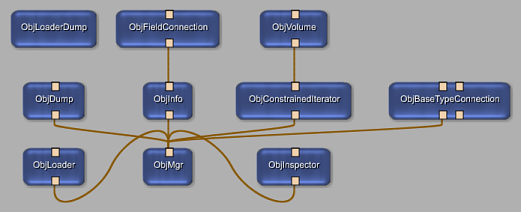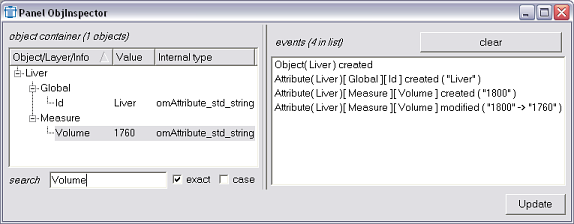ObjectManagerInspector¶
-
MLModule¶ genre Inspectorsauthor MeVis Medical Solutions AGpackage MeVisLab/Standarddll MLObjMgrdefinition MLObjectManager.def see also ObjectManager,ObjectInfo,ObjectFieldConnection,ObjectLoader,ObjectConstrainedIterator,ObjectDump,ObjectLoaderDumpkeywords info
Purpose¶
The module ObjectInspector displays the entire database stored in the connected ObjectManager module. It allows for easy inspection of every aspect of an object and shows associated events.
For conceptual information see ObjectManager.
Usage¶
Connect the module to the ObjectManager or other ObjectManager-client modules (best is to connect the ObjectInspector directly to the ObjectManager).

Details¶
The ObjectInspector’s display is divided in two main areas, the database view (left) and the event view (right).
The database (or object container) view shows the three address components (Object Id, Layer Id, and Info Id) of a stored value, the value itself, and the information cell’s datatype (attribute type).
The search line below the database view facilitates the localization of items.
The event view displays events sent by the ObjectManager. Since the ObjectInspector does not use any filtering, all events will be shown.

Input Fields¶
Output Fields¶
outObjectContainer¶
-
name:outObjectContainer, type:omObjMgrConnection/omObjMgrConnection(MLBase)¶ The module has one bidirectional output connector that allows other ObjectManager-clients to connect.
Since the ObjectInspector has a default priority of -1 it is the first to be notified about events. ObjectManager-clients connected to this module would be next.